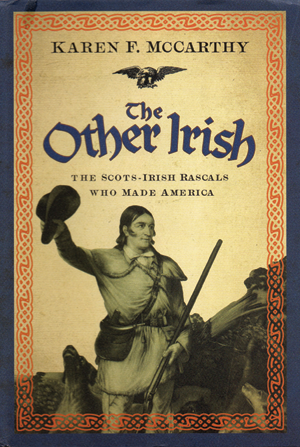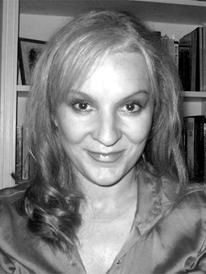By Megan Gillin-Schwartz
 Acclaimed journalist and documentary filmmaker Karen F. McCarthy’s non-fiction debut The Other Irish: The Scots-Irish Rascals Who Made America (Sterling Publishing, 2011) chronicles the strong, yet under-noted Scots-Irish influence on the shaping of the American character. Her cinematic background shines through as she shares the influence of the distinct culture that produced Americans icons from Davy Crocket to the first man on the moon.
Acclaimed journalist and documentary filmmaker Karen F. McCarthy’s non-fiction debut The Other Irish: The Scots-Irish Rascals Who Made America (Sterling Publishing, 2011) chronicles the strong, yet under-noted Scots-Irish influence on the shaping of the American character. Her cinematic background shines through as she shares the influence of the distinct culture that produced Americans icons from Davy Crocket to the first man on the moon.
Q: As an Irish Catholic from Dublin, what inspired you to travel the backcountry of the American South collecting the story of Irish Protestants from Northern Ireland?
KFM: Irish in America, for many persons, is synonymous with Irish Catholic. The irony is, when you actually look at it, the Protestants from the North of Ireland were in America 100 years before the mass of Irish Catholics from the Great Starvation times. They are more responsible for what is the fundamental to the American character than Irish Catholics, yet not everyone knows anything about them. I just thought that was bizarre.
Q: Why do you think that occurred?
KFM: Two reasons, one being The Troubles. If you’re in a war, almost all focus is on the war, not so much on art or literature, so people are not as aware of the richness of their history. Because The Troubles were so consuming, a lot of other history and culture was shuffled into the background.
The second reason is because many of the Scots-Irish landed in America 75 years or so before the Declaration of Independence. By 1776 second and third generation Scots Irish considered themselves American because they were there for the formation of the country. People say they were absorbed into American culture, but when you look at the book, when you look at the quintessential America character, it was largely formed on the American frontier. That’s where the Scots-Irish flourished.
Q: How have people responded?
 KFM: I had quite a difficult time researching the book. I really had to go out and dig to get it first hand. The first place I went to research this book was up to Belfast and Larne. I think in the North people started realizing the history was not all that accessible. They also realized I wasn’t out to make political statements about Northern Ireland, I was just genuinely curious.
KFM: I had quite a difficult time researching the book. I really had to go out and dig to get it first hand. The first place I went to research this book was up to Belfast and Larne. I think in the North people started realizing the history was not all that accessible. They also realized I wasn’t out to make political statements about Northern Ireland, I was just genuinely curious.
When I went back to America to travel around the South, a couple of people in Belfast and Larne were researching in the little archives around town to help me find bits of information to try to piece together the ancient history. I’ve actually gotten quite a lot of emails from people in Northern Ireland, strangers who found my website, thanking me for writing the book.
Q: How did your experience serving as an embedded reporter in Iraq, influence your strategy for researching this book?
KFM: The thing about Iraq is, unless you’ve really experienced it on the ground, you cannot really understand it. All of the preconceived notions I had about Iraq and about the Iraqis changed rapidly. Some for the better, some for the worst, but nonetheless, very different than what I thought it would be.
When I went into the backcountry of the American South, I tried to put aside any preconceived idea and arrive with an open mind. I think that’s why people were so receptive.
Q. What was the most surprising information you found in your research?
KFM: You can’t understand the South unless you get down into the South. When I got down to the South, I had these preconceptions of what it was like in the backcountry because you get derogatory impressions from television that they’re all right wing, gun-loving, uneducated hillbillies, but I discovered that this wasn’t true (although one Virginian did threaten to shoot me for accidentally wandering onto his property). I came out of the South thinking, this must be one of the most misunderstood places on the planet. The American South!
For more information about Karen F. McCarthy and The Other Irish, visit her website: www.karenmccarthy.eu
